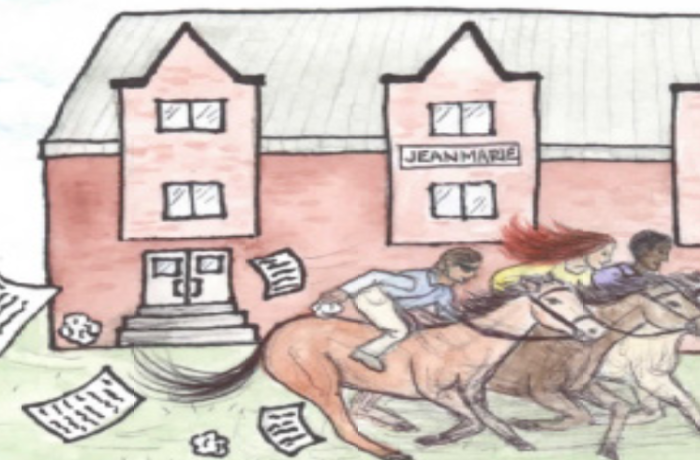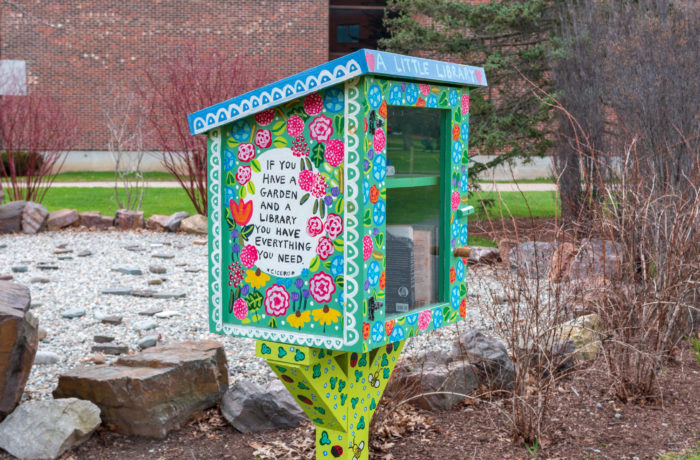 Last Spring, St. Michael’s Fix it With Five committee awarded their annual $10,000 grant to The Burlington Children’s Space Food Bag Program, which offers a bag of groceries to families who need it. Almost a year later, as the final stage of selection for this year’s FIWF Grant begin, we look back at the impact of that $10,000 grant — made up of five dollars from each student’s student activities fee.
Last Spring, St. Michael’s Fix it With Five committee awarded their annual $10,000 grant to The Burlington Children’s Space Food Bag Program, which offers a bag of groceries to families who need it. Almost a year later, as the final stage of selection for this year’s FIWF Grant begin, we look back at the impact of that $10,000 grant — made up of five dollars from each student’s student activities fee.
The food bags come with a nutritious selection of food along with a recipe or recipes to help families put healthy meals together. Each bag has the ingredients for at least two meals for a family of four. When the FIWF grant arrived, it brought relief to the Food Bag Program. “It was nice to feel like we had this cushion of funding, so that we didn’t have to feel like, ‘oh my gosh how many can we put together this week?’” said Erinn Simon, the chef for Burlington Children’s Space. Each bag costs roughly twelve to fifteen dollars to put together, and the BCS puts together anywhere from five to fifteen bags per week. The BCS was able to stretch $10,000 from the Fix it With Five Grant all the way up to mid-February 2017 — nearly a whole year.
The impact of the grant goes beyond being able to provide more food bags for food insecure families. “The rituals around being able to cook for other people are really powerful, and it’s very hard to do that if you don’t have enough food,” said Sarah Adams-Kollitz, director of the Burlington Children’s Space, adding that a core principle of the program is that chronic hunger leads to the erosion of human dignity. Both Adams-Kollitz and Simon stressed that there are a lot of hidden problems that come with food insecurity. “Often, parents won’t even eat with their kids because there’s just not enough,” said Adams-Kollitz.
“The rituals around being able to cook for other people are really powerful, and it’s very hard to do that if you don’t have enough food,” said Sarah Adams-Kollitz, director of the Burlington Children’s Space, adding that a core principle of the program is that chronic hunger leads to the erosion of human dignity. Both Adams-Kollitz and Simon stressed that there are a lot of hidden problems that come with food insecurity. “Often, parents won’t even eat with their kids because there’s just not enough,” said Adams-Kollitz.
“My favorite thing to hear about the Food Bag, is when families tell us ‘Hey we had friends over for dinner or we made brunch together,’” noted Simon.
“[The Grant] freed us up to think of new ideas moving forward. We’ve been able to think about other things we can offer alongside the Food Bags, so we can meet more folks’ needs — more than just folks who really could use that extra food,” Simon said. Each Food Bag comes with a survey, and the Grant allowed the BCS to set aside some time to refine their survey, and think about ways in which they could fine tune the program to better support their community. “One of the things we found is that a lot of people didn’t have a lot of utensils. Now we have a stash of utensils and cooking tools,” said Simon.
“The food bags are always helpful,” a recent recipient acknowledged on their survey adding, “They’ve really thought of everything!”
Some other new initiatives surrounding the Food Bag program include the sharing of shopping lists and recipes through blogs linked on the BCS website. The Food Bags themselves will soon also provide a way for families to literally put bread on the table. Starting this month, each Food Bag will either contain a bread making kit which they can use to make bread from scratch or dough which a family can bake themselves.
The FIWF Grant allotted a great amount of financial capital to the BCS Food Bag program, but the positive momentum that the grant provided has been just as important. “Because it was such a big deal, and the families were so proud that we got it, there was a lot more interest and support in the Food Bag project. New people offered support, and new people also asked if they could take a Food Bag home,” Adams-Kollitz said. “It’s really helped to be able to say that students at St. Michael’s thought that was worth $10,000. It’s helped to show the community that we’re worth supporting. We’ll always be grateful for that.”
Finalists for this years FIWF Grant are:
– Human Rights Campaign for VT
– Migrant Farmers: supporting families in crisis/anti-discrimination policy
– Winchester Place Mentoring for at-risk youth: Expanding existing program to new neighborhood near SMC
– Cash Crop Incentives: Providing access to fresh food at Farmer’s Markets for low income Vermonters.Voting is open at vote-smc.com until noon on Saturday, March 4.


